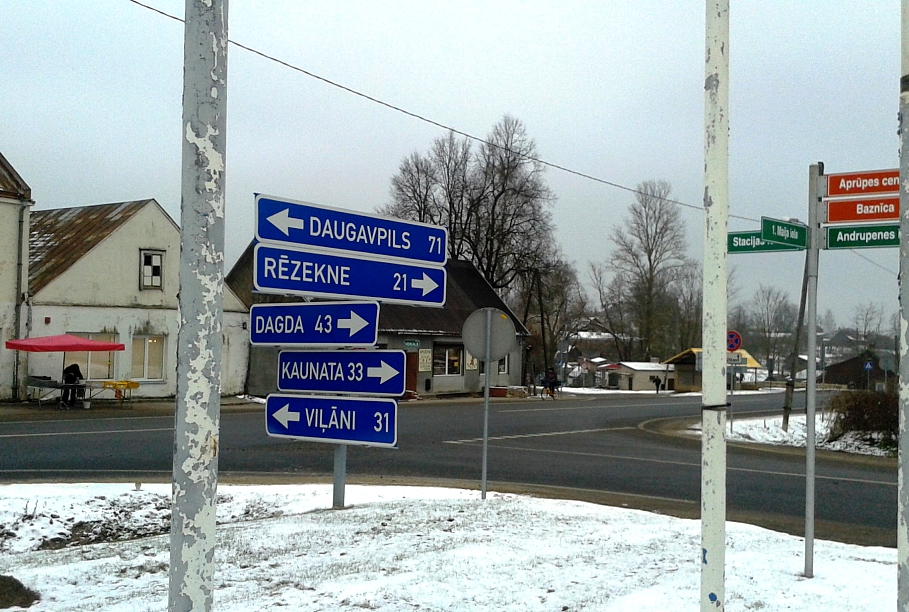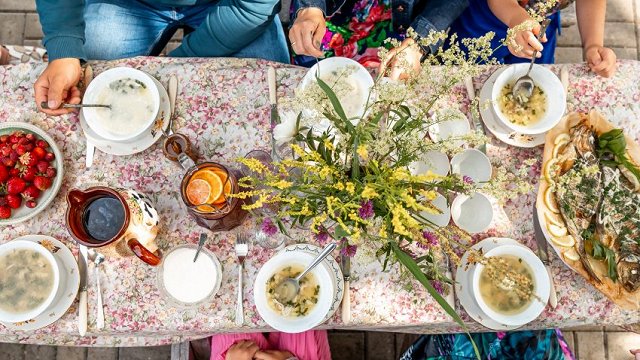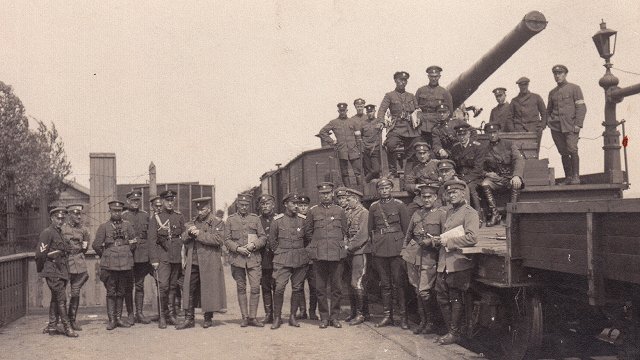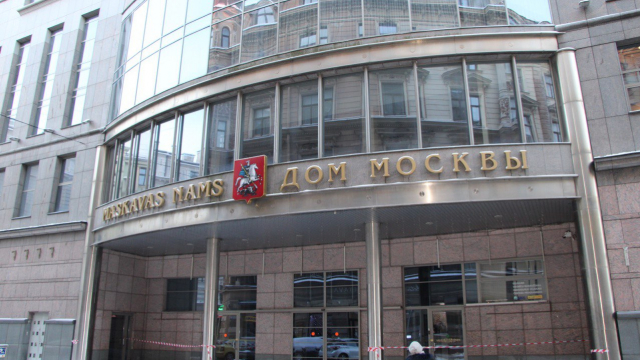Latvian Radio correspondents Silvija Smagare and Edgars Kupčs report from the region that the patriotism is far more visible than audible in the daily language heard on the ground in the farthest eastern areas of Latvia bordering upon Russia and Belarus.
Latgale is certainly not in any way some sort of hotbed of radical pro-Russian activities, as perhaps any such movement might be seen by some as superfluous – the Russian language is the language most people living in the region think and speak to each other in on a daily basis. Perhaps precisely the opposite – at election times, national holidays and now in the context of events in Ukraine conflicts of opinion pop up more often over how minorities are oppressed there.
All in Russian
Late in the workday at Krāslava’s Varavīksne High School the LR crew met a custodian who hardly needed to be prompted to share her concerns.
“Everybody speaks Russian, I say. Soon all those Latvians will have died out. I’m Latvian speaking Russian all the time forgetting my own mother tongue,” said the groundskeeper.
The latest census shows that less than half of Krāslava’s 9100 residents are registered as Latvians. The rest are Russians and Belarusians, whose numbers nevertheless have also drastically fallen, even faster than that of local Latvians. But the janitor noted no evidence of greater orientation towards Latvia amongst local people.
She went on to describe an everyday activity: “I go to the store and speak up in Latvian and everybody looks at me, like this – this stare like ‘what? Are you foreign?” But I do need to speak up in Latvian more, this is true, I should…” she mused.
Local government rep: Media blew school-agitation stories out of nothing
The Varavīksne (‘Rainbow’ in Latvian) school with its 1500 student body is the farthest-located educational establishment in the country’s east, and the curriculum there is bilingual – in Latvian and Russian.
A few weeks ago the media reported on alleged agitation activities in favor of Russia’s currently aggressively expansive foreign policy in Krāslava district, with the school cited as a host site for such ‘friendly guest lecturers’. It was alleged that the school received donations for allowing the politically-engaged visitors to question the very history of the Soviet occupation period.
The students LR met in the hallways at Varavīksne and the school’s administrators rejected any such notion outright. That’s what Ričards and Elvis, two tenth-graders said:
“A school’s a school. Everything’s just fine here. We do well in competitions…” says one of the boys. Of course, they admit, during breaks everybody converses in Russian, because some of the kids still don’t understand enough Latvian to get by otherwise.
“These are people from the minority communities, so it’s logical for them to speak Russian amongst themselves, their native tongue, it’s a Russian-language track school, officially bilingual, after all,” said Krāslava district council Education and Culture Department head Lidija Miglāne. She says the presence of Russian-language in the daily communication of students and staff is a natural, self-evident thing. However, the doors to the permission for political agitation of any kind are emphatically closed, despite occasional visits by deputies who speak about their native culture.
The presence of pro-Russian activities in Krāslava district are a figment of the media’s imagination, there is no such threat, Miglāne stated.
“They are not here specially sent from outside, they just have a different sort of attitude, that’s all. If there’s no jobs for Latvians, then there’s no jobs for the other people’s groups either,” she said.
Pharmacy owner: Russians tend not to be tolerant of other opinions
Seventy kilometers from Krāslava towards the north in the village of Malta, the local pharmacist keeps her store by the side of the Daugavpils-Rēzekne highway busy with clients, mostly looking for remedies to common colds and other seasonal ailments – and doing so in Russian, of course.
“Those are golden words – it’s better to be a Russian here in all respects. Here the non-Russians are extremely tolerant people. If this weren’t so, there would be a lot less of them. They have it very good here. There are very loyal and tolerant people around here who have always respected the opinions of others. But not the Russians. The Russians are like these conquerors – ‘I’m the main-boss around here’!” said Anna.
Slow as it seems, in reality the situation is gradually improving with the change-over in generations. Nevertheless, the comfortable life inside the Russian media-generated bubble of information-space, where among other issues the conflict in Ukraine is presented in tones ever-humbled to the hard Kremlin line, the older generation gets to indulge some of its super-powered imperialistic Soviet-era nostalgia trip on Putin’s side, the town’s pharmacist remarked.
Speaking to the world-view of the younger generation, she observed that “no matter what kind of one-horse village in a barrel they may have grown up in, they know that there is not only the Russian language elsewhere in the world. But the older people – they are still really Russian chauvinists – ‘We the only true nation. Those who don’t speak our mother-Russian tongue are the bad ones – we came here to bring order to this place’. Lived here sixty years and still can’t say ‘hello’ in Latvian! Is he mentally lame? I think not! Or do I have a point, here?” she ended her rant against the elder remnants of the Soviet times, so implacable in their ways of thinking.
As long as the talk isn’t of politics, people of different ethnicities get along just fine in Cibla parish.
Latgalian pensioner Jānis Žeivots arrived in Rēzekne for drivers’ education and told LR he was worried about the prevalence of Russian in people’s daily talking habits, but certainly hasn’t noticed any pro-Russian agitations in the parish. “As long as we don’t get into any arguments, you don’t feel a thing. But when we get into an argument, then I turn into the ‘fascist’,” said the old man.
Zilupe deputy mayor: People here like anywhere else in Latvia
Meet the deputy mayor of nearby Zilupe Vitālijs Vaļdens (Harmony), located at Latvia’s farthest-east border-edge with Russia, 300 kilometers from Riga. The freshly-renovated town council building is still adorned with the flags and attributes of the national holiday. But it’s obvious that all of the satellite dishes on the roofs of the residents’ houses are rotated towards Russia. Only one-fifth of Zilupe’s residents are registered as Latvians.
But Vaļdens says “these are people just like any other people anywhere in Latvia’s territory, and our youth speak perfect Latvian.”
It’s difficult to find evidence of a Latvian atmosphere at the local library, though. LR asked head librarian Nadežda Ļemeševa to name the most popular newspapers and she named both Russian and Latvian publications „Argumenti i Fakti”, „Vesti” un „Ludzas Zeme”.
Daugavpils gets periodic ripples of pro-Russian provocation
Contrary to the experience noted in the countryside, the urban environs of Daugavpils does feel the occasional shiver of pro-Russian activity as the region’s largest city, notes Genoveva Barkovska, professor of history at Daugavpils University and head of the Latgale research center and local Latvian society leader.
“They’re not in parties or political groups, but operate through third-parties, so to speak. As Daugavpils has neighborhood districts, then they have their cells that do the agitation work – silently, hardly noticeable,” the historian relates.
One such agent, a gentlemen in advanced years, recently ‘wandered in’ at the Latvian Society building on National Independence day and began spouting claims that Russia and its local lordships have always ruled here. The researcher of social processes in the local population clarified that now there was fertile soil for fostering followers of such activities. She cited harsh unemployment figures, the emigration of local residents in great numbers and the events in Ukraine. She illustrates her point noting that for every minority group in Daugavpils there is one non-governmental organization (NGO), but in the Russian community there are five NGO’s.
Russia develops, but not better to live there
“What’s the difference whether we’re a backwater of Europe or a backwater of Russia?” asks one of the most active advocates of Russians’ rights Daugavpils Russian Society deputy chairman Jevgēņijs Drobots. He’s an active supporter of May 9th celebrations and a fighter for official status for the Russian language, earlier well-known as a passionate member of the Communist party. Though voluntarily disenfranchised in his non-citizen status from Latgale’s active local political life, he has participated busily behind-the-scenes.
LR met Drobots in the midst of his daily rush on the street, as the brand-new trams of Daugavpils zipped by in the traffic, part of a 10m investment in the city’s transport infrastructure. But Drobots’ conviction in the city and state’s stagnation under capitalism is unbreakable.
“Now of course I wouldn’t go so far as to say it would be better to live under Russia or in Russia. But without a doubt I can say that Russia is developing right now. There are prospects appearing there. Unfortunately there are no such prospects in Latvia, development in Latvia and Europe has totally hit the brakes. But Russia grows! I go to Russia from time to time and my barometer is the number of construction cranes I see up. If there’s construction going on, then there’s development. Find find me one construction crane up in Latvia, here in Daugavpils, just one!
So let me say that the prospects in Russia are better, but I wouldn’t say it would be better to live there,” Drobots continued his attempted comparison.
Professor Barkovska emphasized her view that in a critical situation only a very small part of society might succumb to such propaganda.
But the state’s investment into improving the situation could go beyond merely talking about integration to first of all simply making sure that Latvian Public Television and Radio can be seen and heard in every last corner of Latgale.





























